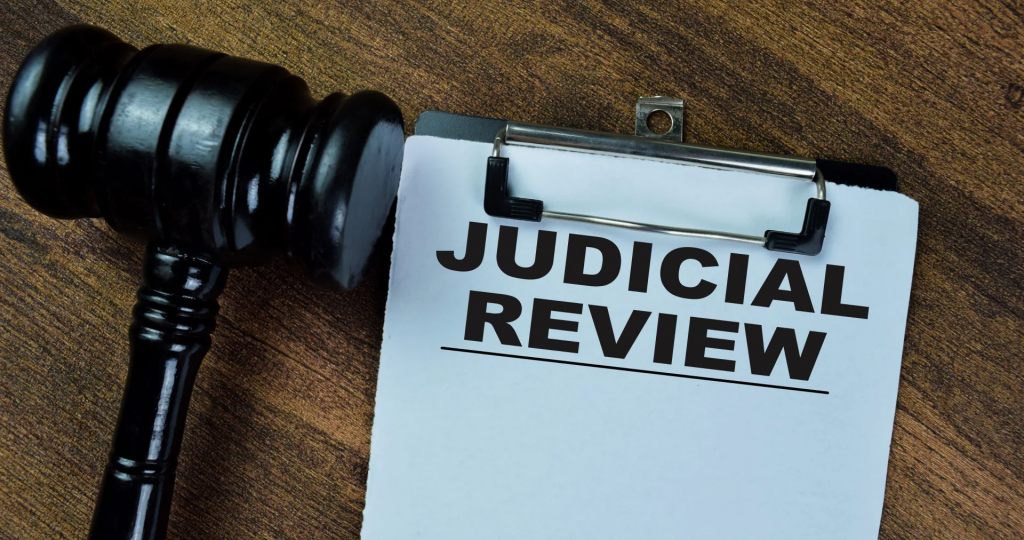The gradual evolution of the Supreme Court into its role as “guardian of the Constitution” is known as the power of “judicial review.” This means that the Court can review acts of Congress and acts of the state legislatures to make certain that they do not violate the provisions of the Constitution as designed by the founding Fathers.
This extremely important power under which the Supreme Court makes its “judicial review” of constitutional issues is not specifically spelled out in the Constitution. However, it is clearly implied by the “supremacy clause,” which makes the Constitution and the federal laws and treaties, the supreme law of the land. Obviously, the Supreme Court would have to use its judicial powers to enforce the supremacy clause, since otherwise it would be meaningless. That this was the intent of at least some of the Founders is borne out by the words of Alexander Hamilton:
“The courts were designed to be an intermediate body between the people and the legislature in order, among other things, to keep the latter [the Congress] within the limits assigned to their authority. The interpretation of the laws is the proper and peculiar province of the courts. A constitution is, in fact, and must be regarded by the judges as a fundamental law. It therefore belongs to them [the judiciary] to ascertain its meaning as well as the meaning of any particular act proceeding from the legislative body. If there should happen to be an irreconcilable variance between the two, that which has the superior obligation and validity ought, of course, to be preferred; or, in other words, the Constitution ought to be preferred to the statute, the intention of the people to the intention of their agents.” 1
In other words, the Supreme Court is to measure all legislative acts against the will of the people as it was set forth in their original charter of liberty — the Constitution of the United States.
A Major Weakness Discovered
But there is one thing missing here. What happens if the Supreme Court imposes its will upon the nation, contrary to the specific provisions of the Constitution? The Founders knew this possibility existed. Alexander Hamilton further reasoned that:
“The courts must declare the sense of the law; and if they should be disposed to exercise will instead of judgment, the consequence would equally be the substitution of their pleasure to that of the legislative body.” 2
Hamilton previously pointed out that an unconstitutional act of the legislative body is null and void. It should be clear, then, that an unconstitutional edict by the Supreme Court would be equally invalid. If this should happen, where is the remedy? By what means do the people protect themselves?




The power of “judicial review” is based on the Duty of public officials (Article VI, US Constitution) to support the US Constitution. When an Act of Congress (the Legislative Branch) violates the US Constitution, should the Judicial Branch of the Federal government side with Congress? Or should it side with the Constitution?
This is the question which Marbury v. Madison answers. And the Supreme Court said their Duty is to side with the Constitution – not Congress. The case was correctly decided – this is the Judicial Branch’s “check” on the Legislative Branch.
Does the Legislative Branch have a “check” on the Judicial Branch? Yes! It is the power of impeachment and removal from the Bench. See Federalist No. 81 at the 8th para. http://www.foundingfathers.info/federalistpapers/fed81.htm
Does the Executive Branch have a “check” of the Judicial Branch? Yes! The Executive Branch has the Duty to refuse to enforce Judgments of the Judicial Branch which the Executive Branch deems to be unconstitutional. That is the “check” of the Executive Branch on the Judicial Branch.
Our Framers were very very intelligent and wise. I bow to them. See this: https://publiushuldah.wordpress.com/2019/11/07/clearing-up-the-confusion-about-marbury-v-madison/
That was a part of the reason for denying the judicial branch its own enforcement arm. It hasn’t worked perfectly, but now and then it’s protected the nation from a runaway Court.